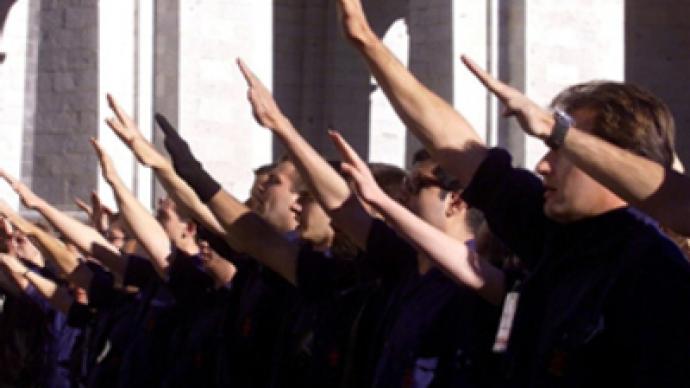Harsh Spaniard xenophobe sentence not harsh enough?

Spain's “inadequacy” in deterring racism has been blamed for rising xenophobic attacks. Will the recent first-ever sentencing of neo-Nazis mean a new intolerance to racism? Or is it just a feeble stab to appease critics?
It has been regarded as a radical breakthrough in Spain's fight against racism, intolerance and xenophobia. The recent sentencing of a neo-Nazi gang known as Hammerskin is the first of its kind and has been welcomed by many as a fundamental achievement in Spain.
The Madrid Provincial Court declared the Hammerskin gang to be illegal and sentenced 15 of its members to between 18- and 30-month prison terms for illegal association, possession of illegal arms and espousing Nazi philosophies.
Spain has for years been home to much racially-motivated abuse from both far-right extremists as well as less radical racist individuals. But the country's seemingly tolerant attitude towards the problem, coupled with the Government's apparent indifference, as evidenced by inadequate formalities and punishments, have been criticized nearly as much as the perpetrators of racist acts themselves.
Throughout this decade, Spain has been involved in many violent incidents involving neo-Nazi gangs. In 2004, two soldiers, members of the fascist Social Republican Movement, were arrested for beating up and stabbing a homeless person in Madrid. Several months later, a group known as The Black Front, which also championed Nazi ideologies, was arrested by police in Barcelona for attacking Muslim mosques and businesses. In 2007, a group of Hell’s Angels was arrested for illicit association. Neo-Nazi material was amongst the items seized by police. According to El Rincon del Vago website, there are at least 14 neo-Nazi groups acting in Madrid alone, and Spain has the largest number of Nazi movements in Europe. Despite Spain's neo-Nazi European dominance and the frequent disputes between gangs and authorities it inevitably causes, up until the recent sentencing of the Hammerskin gang, extreme fascist groups in Spain have never been declared illegal.
Whilst the illegal declaration of the neo-Nazi gang for inciting violence has been fundamentally approved of, some believe the sentences given were not harsh enough and reveal the Spanish Government's arguably “trivial” attitude towards racism and the inconsistency of penalties. Estaban Ibarra, president for the Movement Against Intolerance in Spain, however, welcomes the Court's decision and sees it as an important progression in the battle against racism. Ibarra told Europa Press:
“We are happy with the sentencing. It is a step forward in the fight against racism, xenophobia and intolerance.”
Although the gang's leader has been sentenced to two and a half years in prison, the prosecution was asking for much longer prison terms of between three and six years, and some believe the criminals “got off lightly”. Alfredo Garcia Lopez is amongst those who does not see the “Hammerskin ruling” as a victory in Spain's fight against racism, but rather as a weak attempt to satisfy the critics. The 58-year-old from Madrid told RT:
“I have seen the terror these fascist gangs can put people through and it is getting worse and worse in Madrid. 18 to 30 months is a pittance of a ruling for these kinds of crimes, and is a pitiable attempt to look like they are trying to stamp racism out.”
It is commonly accepted that the surge of xenophobic attacks has been fueled by the increase of ethnic minorities that have immigrated to Spain in recent years. According to Amnesty International, the country is now the biggest magnet for migration in Europe, with the number of immigrants in Spain rising from 500,000 in 1996 to currently 5.2 million.
Although racism and racially motivated attacks are difficult to measure at the best of times, they are especially hard to determine in Spain, where there is no equivalent of the Commission for Racial Equality, resulting in many racial incidents going unreported.
In a country so rife with racism and xenophobia, it was quite shocking when the National Council of Judicial Power and the Social Affairs, Justice and Interior Ministries recently admitted that they did not bother to keep figures on incidents involving racism. Estaban Ibarra told The Guardian:
“We calculate that there are more than 1,000 racist attacks every year. There has been no adequate following of this, however, by governments.”
One victim of racially motivated prejudice is 15-year-old Sara, who has been “suffering in silence” for the last eight years. Sara moved to Girona, in the Catalonia province, from London when she was seven, and has since endured a miserable and lonely existence at school as the victim of ongoing racist taunts.
“Being black and being English I have suffered years of bullying at school. It is not just the other children, but the teachers have never really given me any support. It was like the whole school was in on it.” Sara said.
Amnesty International echoes both young Sara's beliefs, that those in power are not providing adequate support, and Alfredo Garcia Lopez's views, that the Spanish authorities are not doing enough to combat racism. A spokesperson for Amnesty International said to Expatica.com:
“Any government measures to fight racial discrimination in past years have been insufficient.”
But the human rights group's discontentment stretches even further, as Amnesty believes that the Spanish authorities are criminalizing immigrants, namely by the rise in police operations targeting undocumented immigrants. The Spanish press recently reported that police officers in Madrid are feeling increasingly pressurized to arrest a certain number of immigrants each week.
Although whatever the reasons behind the authorities’ alleged victimization of immigrants, the imprisonment of 15 Hammerskin members in a country that is frequently being referred to “racially regressive” has to be a symbol of progress.
Gabrielle Pickard for RT
Read also Toilet Paper To Become Luxury in Cuba












